A bittersweet comedy about a 46 year old Senior Sales Executive who starts questioning his safe, repetitive, suburban life. Series One went out on the BBC from 8 September to 20 October 1976. Every day Reginald Iolanthe Perrin (the brilliant Leonard Rossiter [Rising Damp]) gets up, leaves his middle class Climthorpe home, sees the same faces on the train (which is always late for increasingly imaginative reasons; ‘Staff difficulties at Hampton Wick’, ‘Seasonal manpower shortages, Clapham Junction’, ’Badger ate a junction box at New Malden,’) and arrives at Sunshine Desserts, a pudding company. Reggie sits in a bland office, having meetings with yes-men colleagues David ‘Super!’ Harris-Jones (Bruce Bould) and Tony ‘Great!’ Webster (Trevor Adams), as well as dealing with tyrannical boss CJ’s (John Barron) insane sense of humour and repetitive catchphrases (‘I didn’t get where I am today…’, ‘We’re not one of those dreadful firms that…’). Feeling more and more unhappy, Reggie sees the company’s incompetent doctor Doc Morrissey (John Horsley), but comes away only learning that the medical man seems to feel the same way and has no idea what to do about it himself.
The only spark of light in his day is Joan Greengross (Sue Nicholls), his efficient and shapely secretary, with whom he almost starts an affair on a number of occasions, but always backs out at the last minute. As he comes to the realisation that he’s unsatisfied with life his concentration starts to waver, and he finds himself tuning out of conversations and losing himself in fantasies. These are mainly triggered when his wife Elizabeth (Pauline Yates) mentions her mother (he pictures a waddling hippo) or when he thinks about Joan (the pair of them kissing), but also as a reaction to certain things; saying ‘Why shouldn’t I go to work on roller skates wearing a balaclava helmet and a pair of long johns if it comes to it?’ brings up a vision of exactly that, to wonderful comic effect. As pressure mounts his behaviour becomes progressively more erratic: using the wrong words (parsnip, fish slice) in conversations, saying ‘I can’t be bothered with all this, life’s too short,’ in the middle of a meeting or dictating hilariously abusive letters to clients.
Outside the office Reggie is stifled by his family. His son Mark (David Warwick) spends much of his time sponging off his father before sloping off on a theatre group tour of Africa. His daughter Linda (Sally-Jane Spencer) is married to bland Tom (played in the first two series, and the last by Tim Preece and in the third by Leslie Schofield) – who Reggie finds irritating and often calls a ‘bearded prig’. Their two children, Adam and Jocasta, are being very liberally raised, which also aggravates him. Elizabeth’s brother Major Jimmy Anderson (Geoffrey Palmer [Butterflies, As Time Goes By]) is a failed army officer; not comfortable with civilian life he’s always harking back to his time in service. He calls round to the Perrins’ house frequently, often asking for a small amount of food (‘bit of a cock-up on the catering front’) for his supper, but leaving with the contents of the fridge.
Reggie is at the end of his tether; leaving his clothes in a pile on the beach he heads off alone to find a new life. Adopting a variety of personas he flits from place to place, ending up as a greasy-haired labourer at Pelham’s Piggery. Eventually he realises that he greatly misses Elizabeth, transforms himself into Martin Wellbourne - with a back story of being an old school friend of Reggie’s back from South America -and sets about trying to win her back. His loyal wife immediately recognises him, but is so pleased to have him back, and seemingly happy that she keeps quiet.
Series Two (21 September to 2 November 1977) begins with Martin finding himself fitting all too neatly into the hole that Reggie left (including his soul-sapping job at Sunshine Desserts) and he soon tires of the complications of pretending not to be his former self. After revealing himself to a shocked Linda, she and Elizabeth persuade Martin that he should come clean to everybody; and so Reggie Perrin is re-born. When he unmasks himself at work, CJ promptly fires him, and Reggie finds himself back at Pelham’s Piggery, whilst Elizabeth gets a job at Sunshine Desserts. Unfortunately they are both sacked after a short while; Reggie because Mr Pelham finds out about the fake suicide and is worried about the effect of Reggie’s mental health on his pigs, whilst Elizabeth apes Reggie’s previous form of sending rude letters slating Sunshine’s products. After some thought Reggie opens Grot, a small shop selling rubbish (square hoops, hideous paintings, Tom’s wine) which suddenly becomes a huge success, surprising everybody, and leading to Reggie become the MD of a hugely successful multi-national corporation. In a twist of fate, Sunshine Desserts goes bankrupt, and Reggie employs all his old colleagues at Grot, which now amusingly makes him CJ’s boss. Not long after however, the boredom of corporate life surrounds him again and he decides to bring down his empire by hiring unsuitable people. Jimmy, Tom, Doc Morrissey and complete stranger Seamus Finnegan come on board but unfortunately for Reggie they turn out to be brilliant in their roles, and Grot goes from strength to strength. After trying some outrageous behaviour in the hope of destroying his reputation and therefore Grot’s as well he decides the only way out is to fake his death again, but this time Elizabeth comes with him.
In Series Three (29 November 1978 – 24 January 1979) the Perrins return to a new home, and after witnessing an argument between two men in a queue at the bank Reggie decides to open a commune for the middle-aged and middle-class, to help them become better people. He ropes in the old crowd of family and friends to help, and it all seems to be going well until ‘Perrins’ Peace Keeping Force’ angers some locals and they vandalise the community’s home. Admitting defeat, and needing a job, Reggie begins working at Amalgamated Aerosols, a company run by FJ (yes, it’s his brother…). Obviously, this leads him back full circle to where he started, frustrated and confined behind a desk, slaving for a cause he doesn’t believe in. The final scene of this third series has Reggie investigating the times of trains to the Dorset coast. This series was the weakest of the three; whilst still retaining the well-loved characters, and the beautifully-crafted and amusing script Reggie is no longer a trapped man, and the sharp, poignant humour arising from his former desperation is therefore missing.
The Fall and Rise…is based on writer David Nobbs’ (A Bit of a Do, The Two Ronnies) Reggie Perrin novels, and whilst many darker scenes were left out of the books the programme still captures the overall claustrophobia of Reggie’s world, mainly due to it being Nobb’s adaptation. Leonard Rossiter is utterly brilliant at conveying both sides of Reggie; the despair of being trapped in a life that is slowly suffocating him and the optimism that there is something better for him out there. This is why the fourth series (The Legacy of Reginald Perrin, filmed and broadcast on the BBC in 1996 after Rossiter’s death in 1984) didn’t work; the original shows depended on Rossiter’s mesmerising performance as the central pin holding the story and the other characters together.
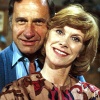
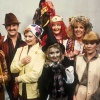
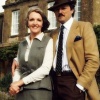
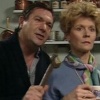
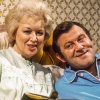
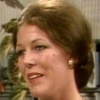
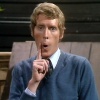
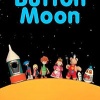

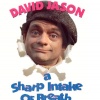
Do You Remember The Fall and Rise of Reginald Perrin?
Do You Remember The Fall and Rise of Reginald Perrin?